How the Eternally Chill Mikal Bridges Became a Cold-Blooded NBA Assassin
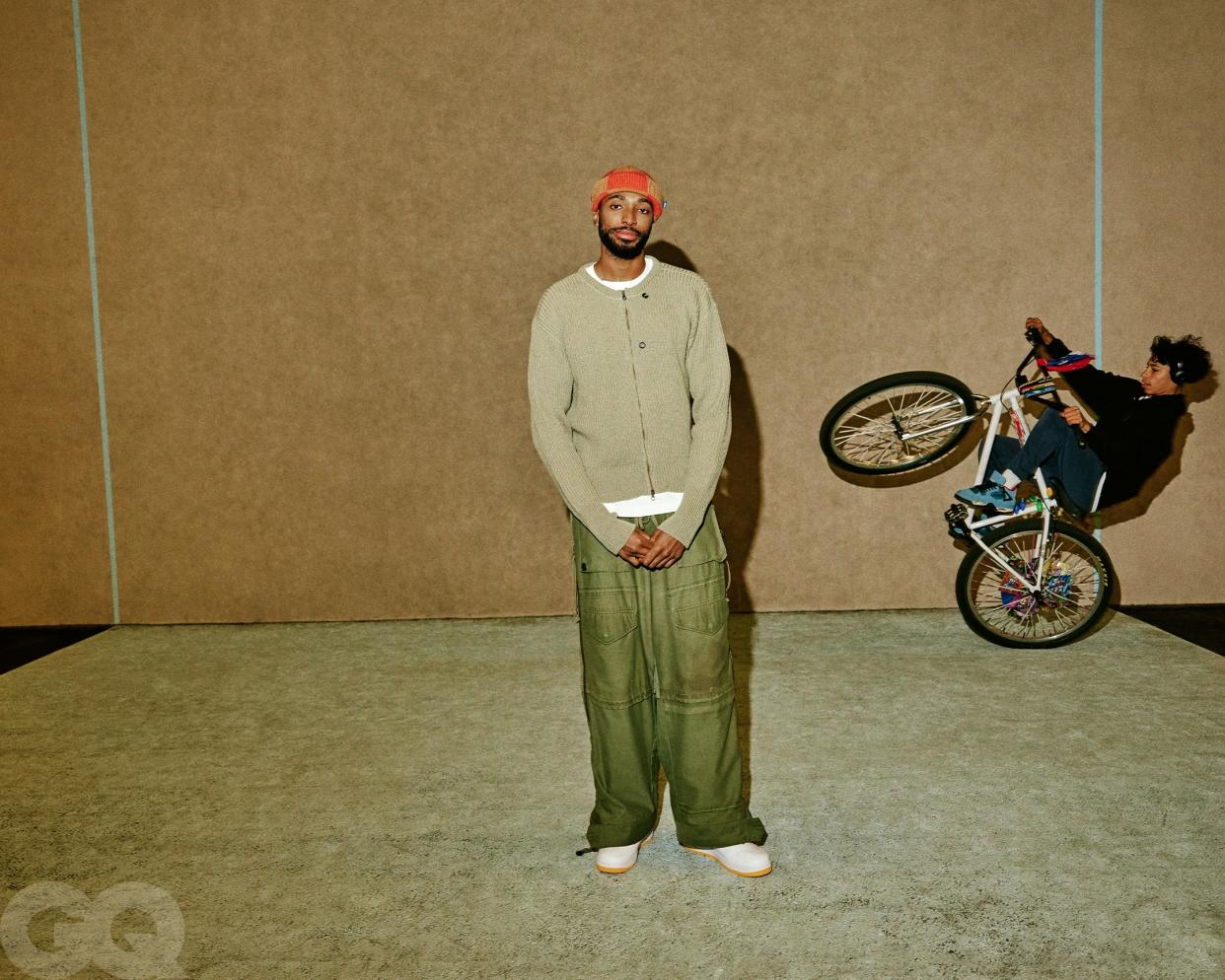
- Oops!Something went wrong.Please try again later.
- Oops!Something went wrong.Please try again later.
- Oops!Something went wrong.Please try again later.
- Oops!Something went wrong.Please try again later.
- Oops!Something went wrong.Please try again later.
- Oops!Something went wrong.Please try again later.
- Oops!Something went wrong.Please try again later.
- Oops!Something went wrong.Please try again later.
- Oops!Something went wrong.Please try again later.
- Oops!Something went wrong.Please try again later.
- Oops!Something went wrong.Please try again later.
- Oops!Something went wrong.Please try again later.
- Oops!Something went wrong.Please try again later.
- Oops!Something went wrong.Please try again later.
Mikal Bridges contorts his impossibly long limbs into a chair at The Odeon, the downtown New York restaurant once frequented by Warhol and Basquiat. Even though he lives nearby in Tribeca, it is his first time here. In an attempt to provide some context for the setting he just stepped into, I inform him that Lena Dunham has a cheeky tattoo of the restaurant’s iconic neon sign. Who? he replies. Perfect.
Bridges—the Brooklyn Nets’ best player—is, by his own admission and my personal observation, unbelievably normal. He takes that as a compliment—and, in fact, says that’s his favorite one to receive. His order—a burger cooked medium-well with no cheese, no tomato, no onion, side of mixed greens—is my first tell. My second is that, under several layers of outerwear, he is also, hilariously, wearing his own jersey, having come straight from a photoshoot that ended with him donning the black No. 1 top that has his name stitched across the shoulders.
As we pulled up to the restaurant, I'd asked if he was really about to wear his own uniform into the Friday night dining room at one of New York’s most storied eateries. I guess, he said with a shrug-and-smile combo that wouldn’t be his last of the night. And as we walked through the door, he pulled his jacket closed a little tighter, lest anyone think the Nets’ unassuming playmaker has some sort of narcissist complex.
Once our orders are placed, my first question is how he feels about…all this. Not just New York City and its temptations, but being the go-to guy on an NBA team in New York City. “I always liked New York. It’s cool to actually be able to live here,” he says matter-of-factly. “I always wanted to live here, actually, so getting traded here was cool. I wasn't tripping too much. I think the next step in life—I'm in this position to lead and be one of the main guys to go try to win games. So like, obviously it's not easy. But I think, yeah, putting [the Nets] on the map is a good thing!”
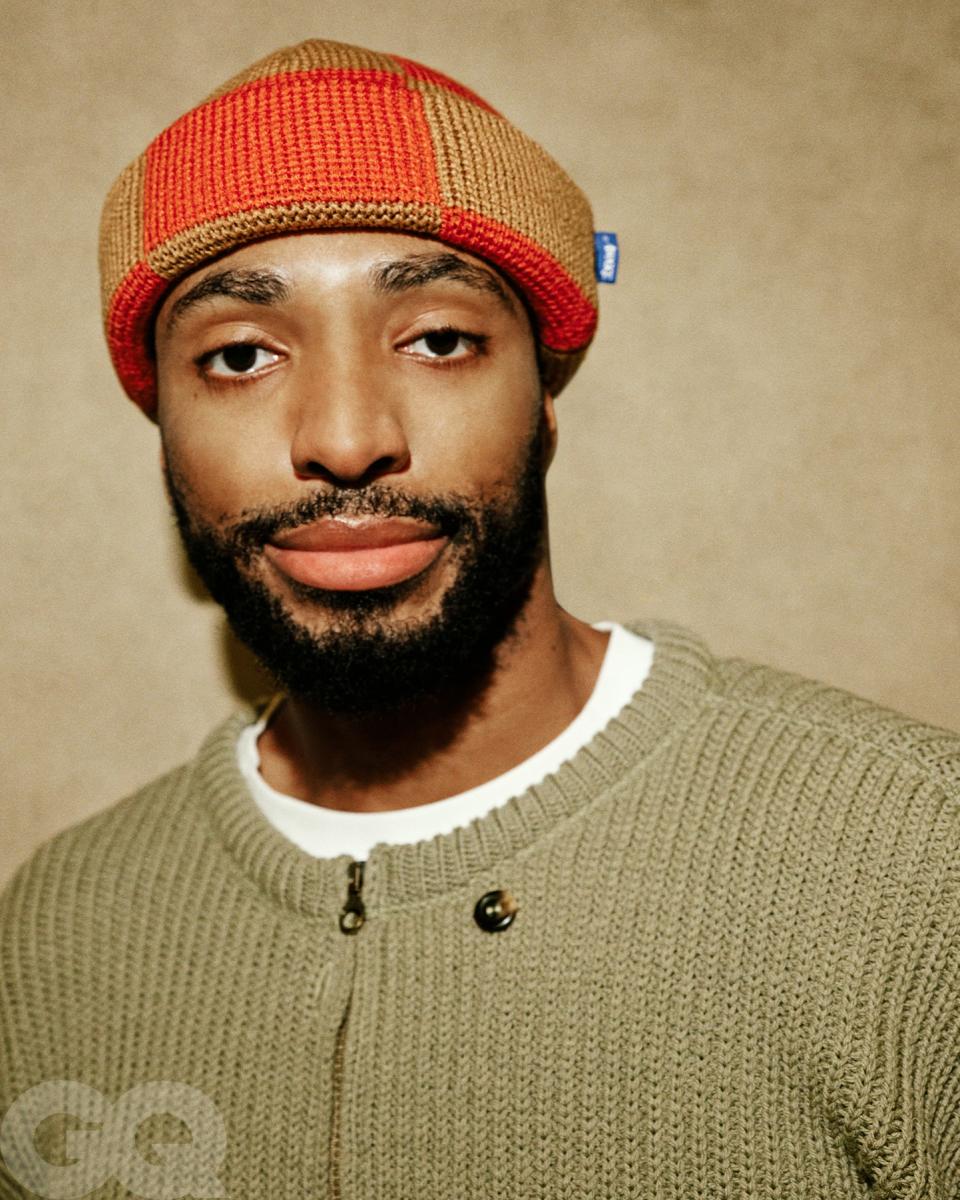
Bridges spent his entire pre-NBA life in the Philadelphia area, and was drafted by the Phoenix Suns in 2018 out of Villanova University. A steady ascent—his scoring average improved every year in Phoenix—proved himself worthy enough to be the main enticement when Kevin Durant demanded a trade out of Brooklyn. Fittingly, Durant’s Twitter bio—I’m me, I do me, I chill—could double as Bridges’ manifesto. Immediately upon arrival at the Nets’ facility, the quiet, unassuming Bridges was thrust into a top dog role, the face of a franchise that has historically looked for them in the wrong places. Since moving from New Jersey to Brooklyn in 2012, each time the Nets have made a concerted championship push, they’ve enlisted the help of established NBA elders. This practice started with acquiring Deron Williams right before the Jersey exodus, ran through the delirious Kevin Garnett and Paul Pierce era that sabotaged their future, and ended with the helter skelter days of trying to get Durant to co-exist with Kyrie Irving and James Harden’s mercurial presences. Bridges—whose acquisition seemed to have finally straightened out a decade of pretzel logic—is the antithesis of that. He’s young and virtually ego-less compared to those old chestnuts, and is now in great shape to be the first modern Net who feels like a Net, rather than a rental from another team that didn’t want to deal with disgruntled drama anymore.
Less than a year since biting into the Big Apple, Bridges says he does indeed feel like a New Yorker, although he sometimes yearns for the desert lifestyle. “I like quiet and I like space, so having a big home in Phoenix was very great,” he concedes. “Coming here was a little bit tighter. It ain't that much space and privacy. You're around a lot of people. But, I feel like I'm just happy I'm living here. You know what I'm saying? I think [when I’m old] I will want to have [had] the experience of living in New York.” Pulling in a $21.7-million salary this season—thanks to a contract extension he signed with the Suns before they shipped him east—keeps him out of a traditional shoebox apartment, obviously. Bridges is living a life of luxury away from the rats, the subway (“I did once but, nah, I’m good”), and the other major adjustments that turn so many transplants off. Embracing the city is a requirement for big-ticket athletes playing in New York—at least, if they want to stave off the angry, torch-and-pitchfork-carrying mobs—and settling into a cushy spot in Tribeca made him a satisfied inhabitant of the concrete jungle.
“It’s real spoiled. It’s not your typical New York,” he says of his neighborhood. “Like you're in New York, but it's not like Midtown or nothing crazy. It's more safe, and it’s quiet. I love it. That's just my speed, you know what I'm saying?” There’s a splash of irony, of course, in the fact that someone who plays for the Nets, prefers to lay low in the cut, and has all of their home games and practices in Brooklyn, chose to live in Manhattan. But much like when he has the ball in his hands—probing his way through defenses with a methodical tempo that seems to almost hypnotize the opposition—Bridges likes having options. He’s the kind of player, and person, who sees the whole court. “I like the city because the thing is, I really chill,” he reiterates. “I don't do much. But it’s great because if I want to get into something, I can. There's so many options and everything's open—open late, too—so you can always get into something. Imagine trying every restaurant in New York! Anywhere else? You go to the same spots. It’s really limited. But here? You’re unlimited.”
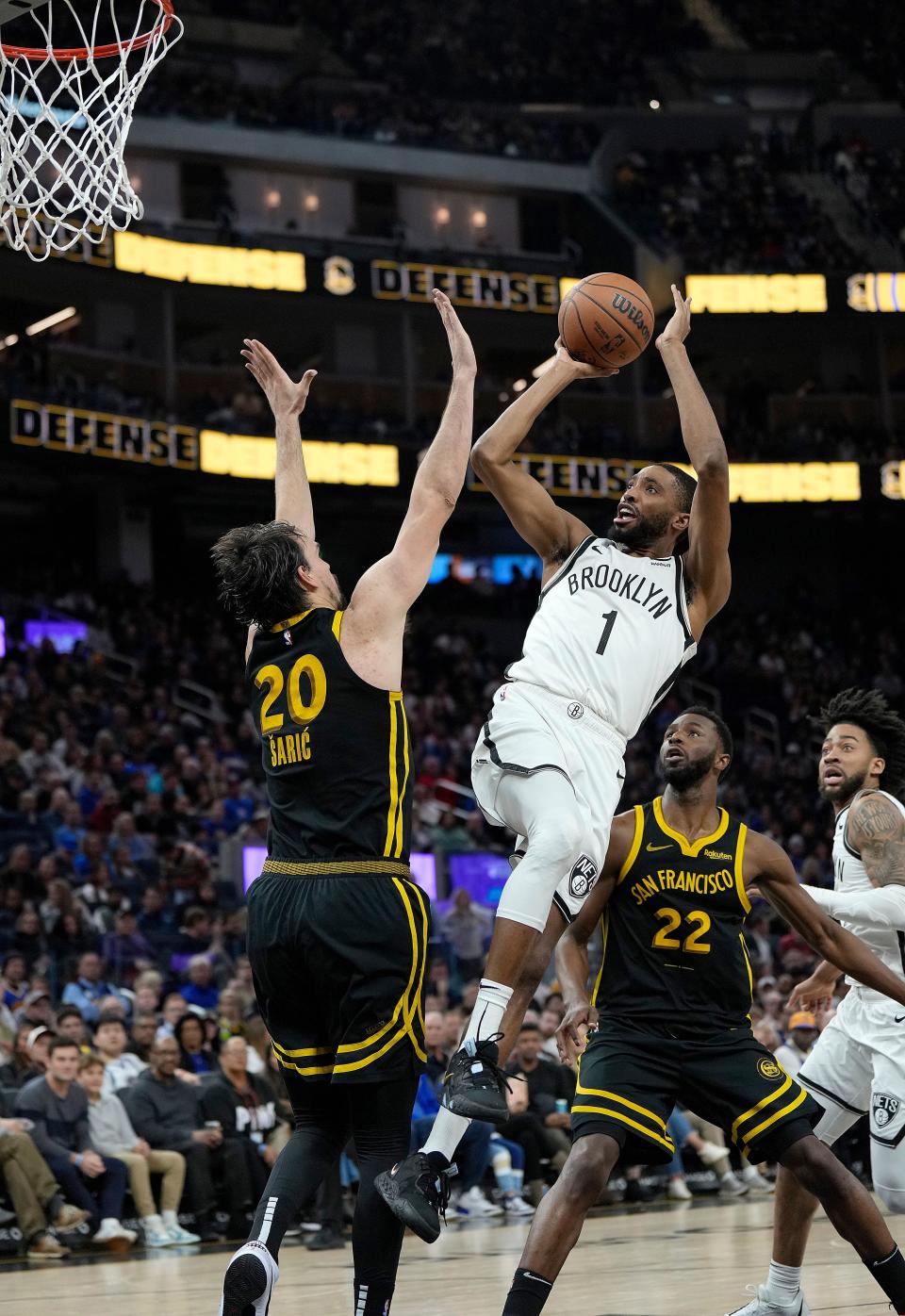
Brooklyn Nets v Golden State Warriors
The next night, powered by Odeon beef, Bridges looks properly unlimited. Facing off at Barclays Center against the Orlando Magic, Bridges erupts. He pours in 26 points in the first quarter, outscoring the Magic all by himself with a brilliant array of corner threes, leaners in the lane, and some impressive finishes at the rim for a self-described “always skinny” guy. He peppers in some defensive highlights too for good measure. That was Bridges’ calling card early in his career—his pterodactyl arms and knowing instincts made him one of the better wing defenders in the league. That defensive tenacity is still there, but now he’s in possession of a remarkably developed offensive repertoire as well. He is now a guy who can go chest-to-chest with the other team’s top scorers—during the Magic game, he puts the clamps on Orlando’s young guns Paolo Banchero and Franz Wagner, who shoot a combined 38 percent from the field—but also drain fadeaways and score through contact with his left hand.
At halftime, he’s got 34 points, setting the bar for most points scored in a half by any player this season. While he’s at the free throw line, chants of “BROOK-LYN BRID-GES” rain down on him like a December storm. After sinking one of his 15 foul shots, he points to a kid wearing his jersey, sending the youngster into a screaming fit of jubilation. As he continues heating up, you can almost see the moment he decides that Wagner cannot stop him. He does not relent, and in a slightly out-of-character moment, he chirps at the Orlando bench to “get him off me.” The previous night at dinner, he told me he’s not big on trash talk—unless someone else starts it, or he “randomly gets in a mood.” This appears to be one of those moods, and the scoresheet at the end of the night confirms it: 42 points on 12-of-20 shooting in a commanding 28-point win for the Nets. He falls three points shy of his career high, and one of the only blemishes on his masterpiece are a trio of missed free throws that would have matched the milestone. I ask after the game if those three misfires will haunt him. “Nah, not really. I don’t care. I just wanted to win that game, bad.” Simple and direct. Real Mikal Bridges shit.
When it’s time to get down to business, Bridges relishes having all eyes in the building on him. “I understand embracing the culture wherever you're at, especially in New York,” he grins. “They'll love you. If you play well, play hard, and care, they'll love you.”
Embracing the culture has not yet meant buying a pair of Timbs, though—just more coats and hats. I bring up Carmelo Anthony, the last New York hooper who really championed the city’s cause. “The dude was chilling,” Bridges says of Anthony, showering him with his own brand of praise. “I remember he was a big chiller.” During his heyday with the Knicks, Melo was not shy about romping around the city, including the famous instance where he perused a local bodega in his bathrobe. Bridges has sort of done the same, if in his own style. “I used to go to this one bodega—I always say corner store,” he clarifies. “But I've been eating healthy, so I don't go there anymore. I used to, oh yeah, all the time after games! Late night, bring my dog, walk in there and get a sub or something.”
Bridges is notably thin, one of those people who could eat anything and everything growing up and not see any physical changes. He’s tailored his diet to fit the standards of the efficiency-driven sporting world, but still maintains a lean appearance that makes him look almost like a swimmer—all drawn-out proportions and gangly features—not someone who has to consistently absorb body blows from seven-foot behemoths.
If he has a trademark thing, that might be it—being skinny. Some of the nicknames listed for him on Basketball-Reference include String Bean, Praying Mantis, and Noodles, though it’s unclear how much anyone actually calls him those things. His angular body has its utility on the basketball court, but it also makes him oddly recognizable—the six-foot-six wiry guy shepherding his Labrador retriever, Sonny, around one of the most expensive neighborhoods on the planet is a fun visual.
He is not the sort of athlete who minds recognition, though. If anything, he’s kind of confused by it. “The thing is, I just try to normalize myself so much,” he says. “I don't try to picture myself as an NBA player, like this guy. To myself I'm like, ‘Damn, man, I'm getting bothered.’ But like, okay, be real with yourself. I know I'm trying to make myself as normal as possible, but it's not normal. I think the world doesn't help. Being on the internet, it doesn't help. But I just try to be as low-key as I can. Not low-key, like, normal.”
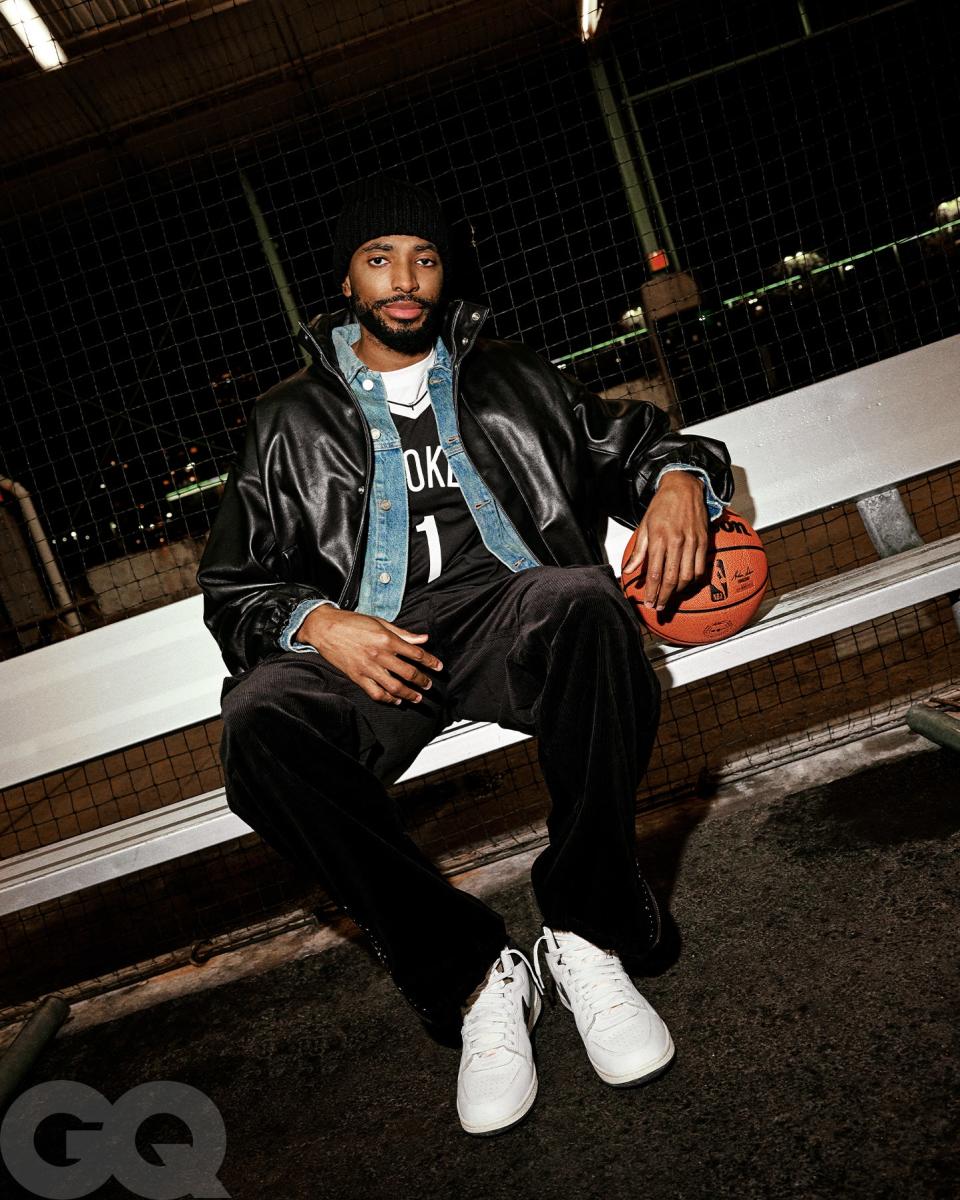
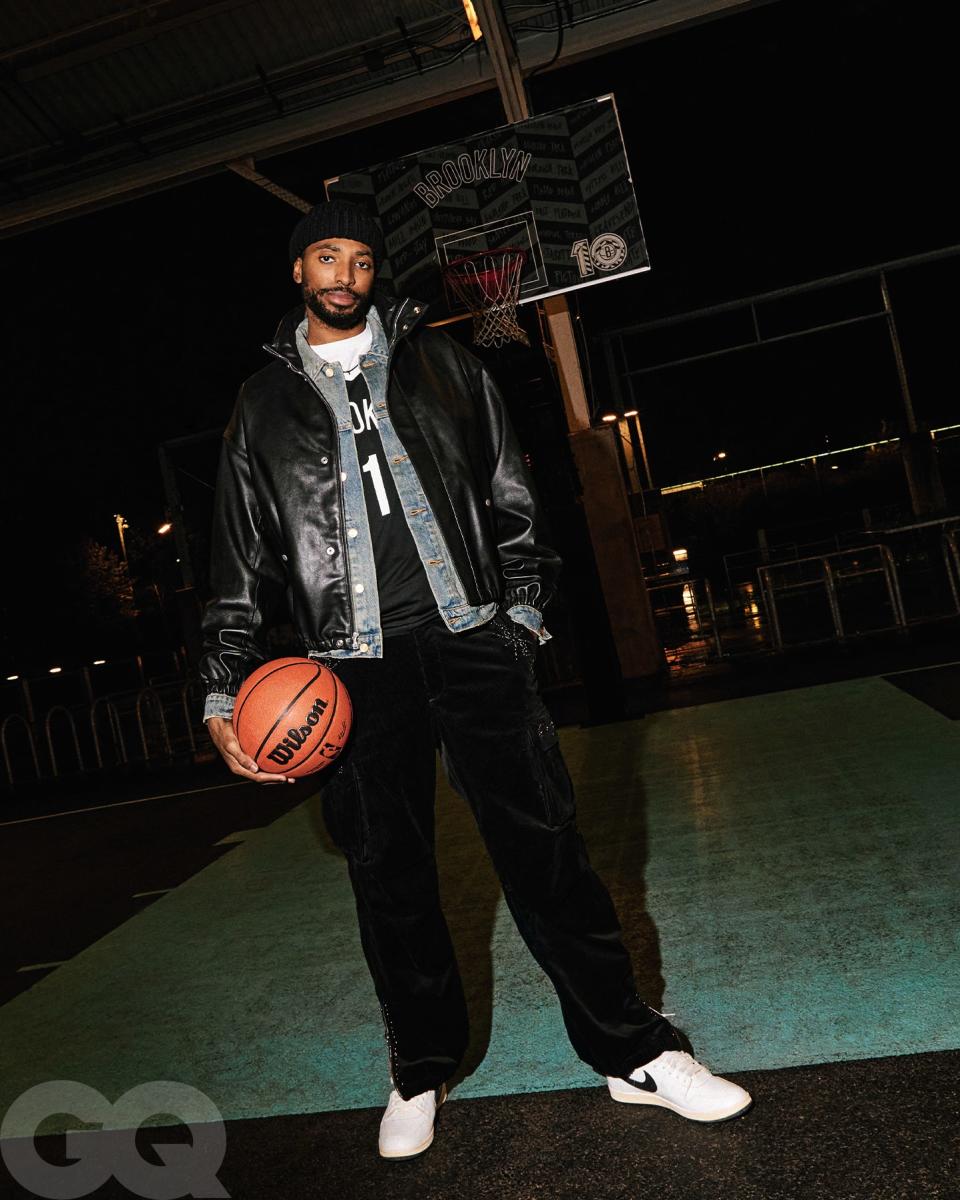
Bridges is, all at once, balancing several undertakings with his supersized wingspan. He’s naturally cool, calm, and collected, and the dictionary definition of a good hang. But on the other hand, he’s the conductor of a team with playoff aspirations, and leadership is a tricky thing in a sport where most players want the ball in their hands, but there’s only one to go around. His Nets teammate, fellow 27-year-old Cameron Johnson, does not know life in the NBA without Bridges. Johnson joined the Suns in 2019, one year after Bridges, landing on a team that went 19-63 the year before. (“Listen, I don't wish that on nobody,” Bridges says of his rookie year full of despair. “It was not fun losing all them games. Nineteen wins. I always remember that 19. That was bad.”) Along with Devin Booker, Bridges and Johnson helped the Suns shine brightly again, and in 2021 they piloted the organization to its first NBA Finals appearance in 18 years. The Durant trade sent both of them packing, and the two twentysomethings—known to Phoenix fans as “the twins”—were forced to uproot the only professional lives they’d ever known. But they had each other. When I approach Johnson in the Barclays locker room and ask for some dirt on his running mate, something that the rest of the world might not understand the way he does, he is prepared.
“He’s goofy as heck,” Johnson fires at me. “He’s always playing around. First of all, he’s always tweeting something low key—almost controversial—because he understands he has the power to do so. He understands that people are going to read deep into anything he tweets because he thinks it’s funny. He’s like, They’re gonna love this.”
Bridges’ coach, Jacque Vaughn, bounced around for 12 seasons as an NBA player, breaking into the league as a rookie on the Utah Jazz team that lost to Michael Jordan’s Last Dance squad. He spent time around multiple Hall of Famers from all around the world, each one with their own unique piquancy. But with Bridges, he’s found himself a certified goofball cut from a much different cloth than anyone from those days, when the NBA was much more rough-and-tumble. Having a sillier disposition can be viewed as undesirable in sports, especially for top players. But Vaughn has seen Bridges’ killer instinct emerge often enough to know he’s a true dude. “His will, putting his stamp on a game—whether that’s scoring the ball, initiating the offense, making the right play—that mentality is what I look for at the beginning of a game,” Vaughn expresses. “Body language, how he’s looking in the huddle. All that stuff matters.”
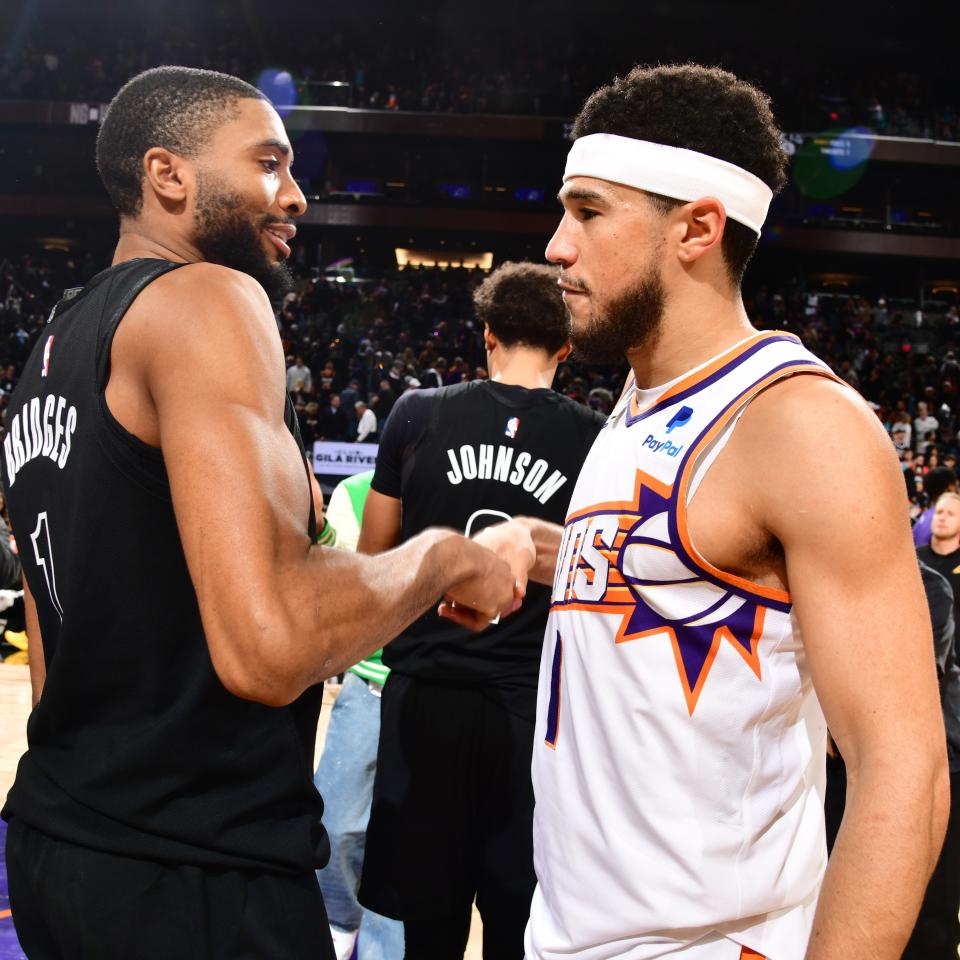
Brooklyn Nets v Phoenix Suns
Bridges knows that when he’s playing poorly, he has to tone down the goofiness, otherwise the sports media militia will craft narratives about how he’s not taking things seriously enough. But the thing is, he doesn’t play poorly very often at all. Bridges is in prime position to make his first All-Star team, and if he can lead the Nets to the playoffs, his clout will only increase. He also does not miss games. In the age of load management, Bridges is a rare bird: He’s quite literally never missed a game due to injury. Not in college, not in the league. One of the quirks of being traded in-season last winter was that he played in 56 regular-season games for the Suns and 27 with the Nets. That totals 83, one more than the 82-game schedule. Establishing oneself as that reliable, especially on a postseason team, is currency in the NBA. There are only 30 teams, so there can only be 30 best players on their team, and if you’re the best player on one of the better teams…
“It comes with a lot of pressure,” says Johnson, accurately reading my mind. “He’s handled it very well. He works on his game every day, and everything that he works on continues to come to fruition.” The titles and the accolades—the declarations that he’s “him”—don’t matter much to Bridges. Winning does, though. Frankly, he doesn’t know anything else. Bridges won two national championships in college with an absurdly stacked Villanova outfit (four of his college teammates play for the Knicks) and dropped 27 points in a Finals game less than three years after being drafted. It’s been a charmed basketball life, with the added vote of confidence that came with being traded for one of the greatest to ever do it. “I think if it was somebody worse, then it's kind of, What's going on? But, nah, it's KD, so it's reasonable,” he says. The winning DNA is there, but not in a maniacal way where each loss fuels a workout rampage into the next morning. “With the world and where it’s at right now, everything is about winning, which is not real life,” Bridges says. “Only one team wins, you know what I’m saying? So does that mean the other 29 are losers? The world makes it seem like if you don’t win, you’re not good, which is very toxic. I’ll get frustrated for sure, especially if someone’s not doing the right things. I get frustrated if we’re bullshitting out there, because I know what it takes to win. You don’t know unless you’re in it. I’ve definitely been blessed.”
Vaughn has nearly a year’s worth of evidence that Bridges’ unique form of leadership—more meme-sharing than motivational speech-giving—works for his team. “You see it in a lot of ways,” Vaughn says. “Subtleties. He has a special handshake with every single guy on the roster. Little things like that go a long way. During shootarounds, when we’re talking about how we’re going to guard pick and rolls, he has a response that he’s able to communicate to the group. Those little opportunities for leadership, he’s slowly but surely stepping into. It is a tall task to do it every single night in this league at both ends of the floor, and we’re asking him to do that.”

As our dinner plates are cleared and Bridges declines dessert, the steadfast chiller begins opening up about his life outside the arena. He’s an eligible bachelor, after all, and he’d prefer to stumble into a New York rom-com moment rather than use the apps. (He says he’s not on Raya.) “I think I surprise people,” Bridges says of his dating life. “Women, they’re around a lot of athletes who pop their shit, this and that. I just chill. I try to meet…I don’t know. I think all that’s tough. I want it to be natural, like randomly meet somebody. But I’m also kind of at the stage now where I’m not even looking to be with anybody. Just being on my own, single and chilling.” He does have a new restaurant to add to the date rotation, though. “This is the spot!” he says with a laugh, looking around at the Odeon’s festive holiday decorations. “Tell them to get the burger.”
He might be content with being single, but he’s not totally on his own, thanks to his darling Sonny. Sonny is one of his biggest expenses, not jewelry, shiny cars, or the latest fashion drops. “I don't spend money crazy, honestly. It’s like, Amazon. When I walk my dog, I need a glove, I need this. I'll get him a new leash, new collar, if I want something, I could just…get it. I order waters all the time. Little things like that. I appreciate not having to think about or worry about my bank account. Oh, ah, I went to dinner, I can't. No! I go to dinner, and I can get what I want.” His current four-year contract—totaling $90.9 million in base salary alone—expires in the summer of 2026. Barring a re-up with the Nets before that, it will be the first time he hits free agency. Given the trajectory he’s on—right now, he’s averaging the most points, rebounds, and assists of any season in his career—Bridges could very well go from rich to richer, famous to more famous. He does a lot of thinking about fame, and its flip side, saying that he likes subverting people’s traditional idea of the up-and-coming baller. “I like when I meet people, and the first thing they get from me is like, ‘Oh, you're really calm. You're chill.’ I'm like, ‘That's great!’”
He’s seen ravenous competitors up close, enough to know that that’s not his style. (Chris Paul, he says, “had that craziness.”). He realized that he can let things go a little easier than CP3, who was his Phoenix teammate for two and a half seasons. He’s also aware of the stereotypes that surround wealthy athletes, especially NBA players and their penchant for partying, but he doesn’t even drink during the season. Part of that, preciously, is that at 27 he feels like he’s already getting old. “When I usually do drink in the summer, I drink pretty hard. I’ll just keep going. That’s how I’ve always been, and now I’ll be hurting for days, bro. It used to just be, Oh, I feel like shit in the morning, by end of the night I’m okay. Not anymore!” He’s been in his lane long enough to know exactly how to steer through it at a speed he enjoys. He’s just…normal.
“I mean, the life athletes live—or any famous people—you kind of get put in this box,” he says. “Being famous, you can't do this and that like an average person. So I just try to tell the world, ‘Listen bro, I'm just like you. I just play a sport.’ You know what I'm saying? I have friends, I joke around, I just play a sport and make some money.”
PRODUCTION CREDITS:
Photographs by David Cabrera
Grooming by Ryann Carter
Originally Appeared on GQ

